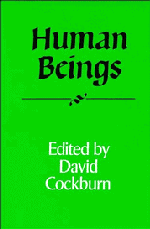Book contents
- Frontmatter
- Contents
- Introduction
- Machines as Persons?
- The Importance of Being Human
- Response to McNaughton
- Response to Diamond
- Real Selves: Persons as a Substantial Kind
- Personal Identity and Brain Transplants
- Personal Identity and the Idea of a Human Being
- Imagination and the Sense of Identity
- Radical Critique, Scepticism and Commonsense
- Getting the Subject back into the World: Heidegger's Version
- Incarnational Anthropology
- How Many Selves Make Me?
- Sartre and Our Identity as Individuals
- Bibliography
- Notes on Contributors
- Index
Personal Identity and the Idea of a Human Being
Published online by Cambridge University Press: 05 February 2015
- Frontmatter
- Contents
- Introduction
- Machines as Persons?
- The Importance of Being Human
- Response to McNaughton
- Response to Diamond
- Real Selves: Persons as a Substantial Kind
- Personal Identity and Brain Transplants
- Personal Identity and the Idea of a Human Being
- Imagination and the Sense of Identity
- Radical Critique, Scepticism and Commonsense
- Getting the Subject back into the World: Heidegger's Version
- Incarnational Anthropology
- How Many Selves Make Me?
- Sartre and Our Identity as Individuals
- Bibliography
- Notes on Contributors
- Index
Summary
The central fact about the problem of personal identity is that it is a problem posed by an apparent dichotomy: the dichotomy between the objective, third-person viewpoint on the one hand and the subjective perspective provided by the first-person viewpoint on the other. Everyone understands that the mind/body problem is precisely the problem of what to do about another apparent dichotomy, the duality comprising states of consciousness on the one hand and physical states of the body on the other. By contrast, contemporary discussions of the problem of personal identity generally display little or no recognition of the divide which to my mind is at the heart of the problem. As a consequence, there has been a relentlessly third-personal approach to the issue, and the consequent proposal of solutions which stand no chance at all of working. I think the idea that the problem is to be clarified by an appeal to the idea of a human being is the latest manifestation of this mistaken approach. I am thinking in particular of the claim that what ought to govern our thinking on this issue is the fact that human beings constitute a natural kind, and that standard members of this kind can be said to have some sort of essence. Related to this is the idea that ‘person’, while not itself a natural kind term, is not a notion which can be framed in entire independence of this natural kind.
- Type
- Chapter
- Information
- Human Beings , pp. 127 - 142Publisher: Cambridge University PressPrint publication year: 1991
- 2
- Cited by

